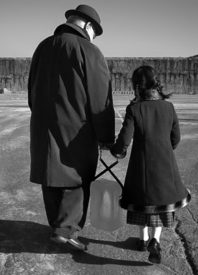
We often talk about putting ourselves in the shoes of others, but few rarely do. Doing so would not only require letting one’s guard down, but also having difficult conversations about history and the narratives we have been raised on. This is the complex journey that Israeli-born psychoanalyst and filmmaker Ofra Bloch finds herself embarking on in Afterward.
The granddaughter of Holocaust survivors, the scars of the past and the perceived threats to the future were ingrained in Bloch from an early age. She grew up fearing not the monsters underneath the bed, but people who identified as Germans and Palestinians. It was something that she never questioned as history and those around her made the facts clear. They were the victims once and would fight to ensure that those atrocities did not happen again.
Now that she is older the lines between the victims and the perpetrators are not so clear. Attempting to reconcile with the trauma of the past, by talking to the children and grandchildren of Germans who lived through that painful era of the Holocaust, Bloch is unexpectedly forced to confront her own prejudices. This ultimately leads her down a path that will not only touch on the global uptick in anti-Semitism and fascism, but also shine an uncomfortable light on the Israeli occupation of the West Bank and the Gaza Strip.
Afterward is a film that raises many questions, but offer few easy answers. Bloch’s documentary understands that one’s perception can be framed by others and feed to you from birth. This is one of the reasons why Afterward is an effective and important conversation starter. Bloch’s film forces the audience to really see the humanity in those often deemed as “the other.”
It is through the conversations that she has with everyone from academics to activists to a former neo-Nazi that the tightly woven threads of fear and hate become apparent. Fear is shown as a tool of the oppressors to justify their brutal treatment of the oppressed. A point that really hits home when the film juxtaposes the signs Germans posted to restrict Jewish life, with the signs Israeli’s now hold up to justify the killing of Palestinian.
As Bloch wrestles with her own issues related to history and the trauma of violence, the viewer cannot help but reflect on the vicious circle that fear and rhetoric has create. One where even those who wield the power leave in constant anxiety of those they oppress.
Afterward raises many thought-provoking questions about the oppressive nature of fear and how one’s perspective can turn a freedom fighter into a terrorist or vice versa. It is only through difficult and honest conversations, and the willingness to see each other as people and not things, that the cycle of trauma can be broken.
- Release Date: 3/13/2020

